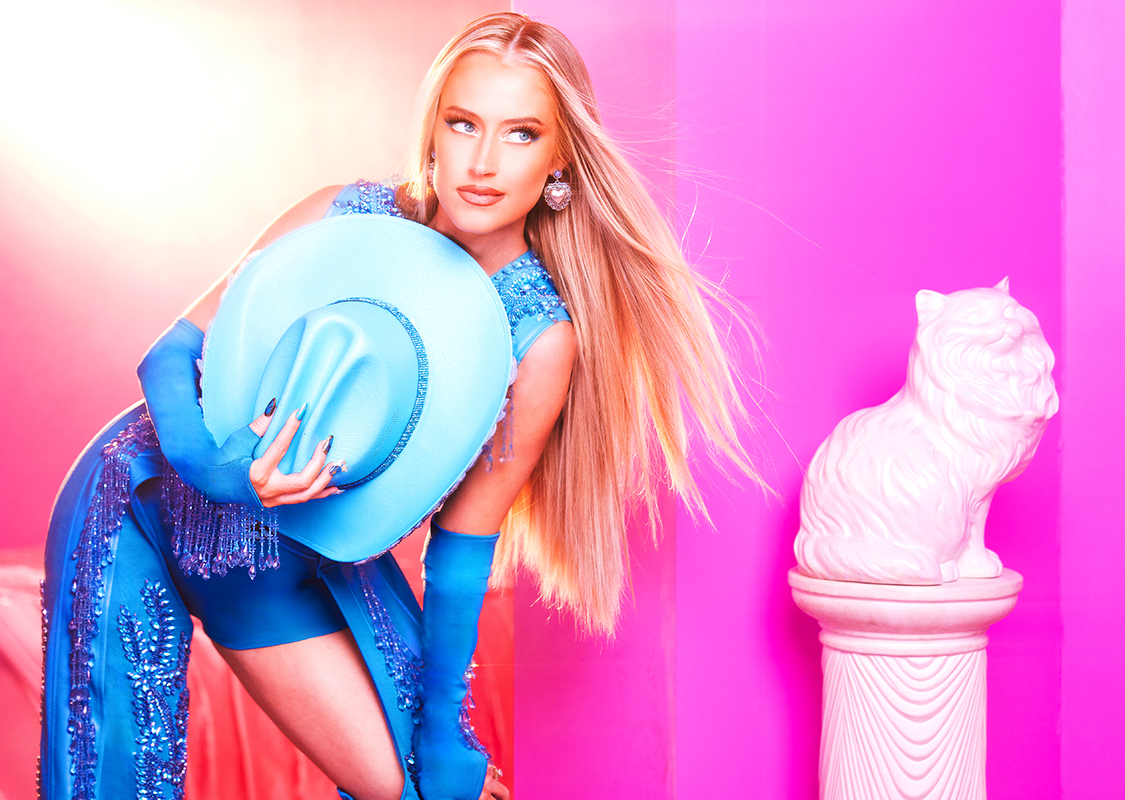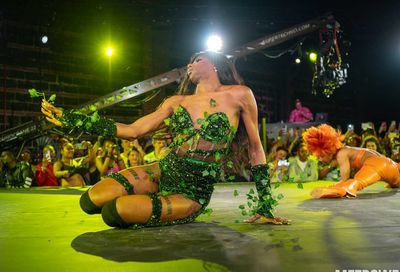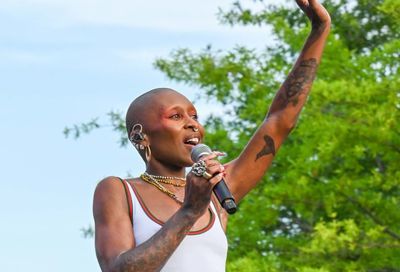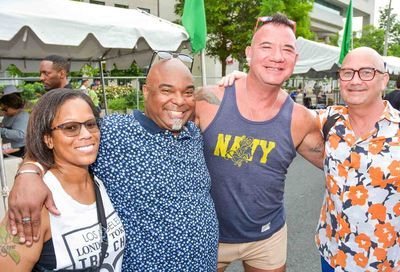Family Ties
Family Pride Coalition's Jennifer Chrisler on the fight for gay and lesbian families
When it comes to gay and lesbian families, the past year has seen a bit of bunny business.
You may remember last year when Buster Bunny made a PBS-televised trip to Vermont where he introduced his tiny tyke audience to a family with two lesbian mothers. The Bush administration wasn’t happy with Buster’s inclusive approach. The Family Pride Coalition was one of a number of GLBT groups that immediately came to Buster’s defense, seeing an opportunity to educate the nation about the growing number of gay and lesbian families.
“We as a country need to come to grips with the fact that despite what the conservative movement would have us believe, family is not always a mom and a dad in a married situation in a nuclear family with two kids and a dog and a house in the suburbs with a white picket fence,” says Jennifer Chrisler, Family Pride’s executive director. Her group screened the Buster television show on the Web and around the country.
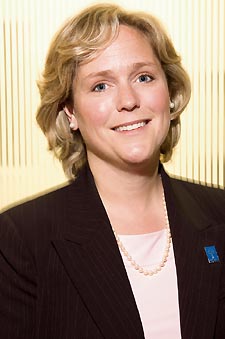 |
This year, the Easter Bunny took center stage when the world of conservative pundits was shocked to learn that Family Pride was helping organize gay and lesbian families to attend the annual White House Easter Egg Roll. Originally the idea of a member couple who had taken their own child to the traditional event, the idea quickly grew into a cause celebre for the gay community, a chance to show the nation the faces of gay and lesbian families.
“The truth is that when our families are seen, when our families are visible, it just goes to show how everyday average we really are,” says Chrisler. “We do all the same things that families all across the country do.”
When the White House eggs get rolling this Monday, April 17, Chrisler will be there with her partner, Cheryl Jacques, and their twin sons, Tim and Tom. The couple hail from Massachusetts, where Jacques had very publicly emerged from the closet while serving as a state legislator. The couple moved to Washington when Jacques took the helm of the Human Rights Campaign, a position she has since left.
Chrisler has served at the head of Family Pride for nearly two years, during which time the organization has increased its profile in the ever-growing number of state and federal battles over adoption, reproduction, marriage and other issues that go to the heart of what it means to be a gay and lesbian family. What began as a group of gay fathers looking for support in maintaining their parental rights during the early days of the movement has grown into an organization that provides information, research and support for the broad range of GLBT people fighting for the rights of themselves and their families.
Cartoon bunnies and colorful holidays notwithstanding, there’s no funny business when it comes to fighting for GLBT families.
METRO WEEKLY: When the conservative talk-show world picked up the story of gay and lesbian families attending the White House Easter Egg Roll, were you surprised or did it seem par for the course?
JENNIFER CHRISLER: It seemed par for the course. The idea that we would actually have kids and parent them and do a good job of it, I think that’s terrifying to them. They know when people meet our children and meet our families and understand that we are just like our neighbors next door, it terrifies them, because that is the message that is eventually going to turn the tide in this country. It will loosen the grip that a very small, but vocal, minority of people have had on politics and on legislation for too long in this country.
MW: Given the Easter Egg’s Roll’s prominence as a long-standing tradition, does focusing on it as a topic for gay parents and their children risk politicizing it to the point of a backlash on these issues?
CHRISLER: I don’t think it’s a risk and I don’t think it’s politicizing the event. I think the other side is the group that wants to politicize it, because that plays into their strategy. And I think we should be really clear: The White House Easter Egg Roll has not always been without controversy. When Mamie Eisenhower opened the White House lawn to black children for the first time, there was a huge outcry. But she did the right thing and said every child has a right to come and roll an egg down the front lawn of the people’s house. In my mind, this is no different from any situation where you want to create an open and welcoming environment for all the children of this country, so they know that they are valued, that they are respected, no matter who their parents are.
MW: Laura Bush has publicly said that every family is welcome at the event. Do you consider that a victory?
CHRISLER: It was the right thing for her to do. I think as a mother she understands how important it is to afford great opportunities for your children, and this is a really fun, amazing, festive event that will create great memories for children for years to come. LGBT families should know that they’re welcome there and I’m glad that the First Lady affirmed that.
MW: There are a number of state legislative and other efforts aimed at limiting or ending adoption by gay couples. Some people think this anti-gay strategy is a legitimate threat, others think the right wing won’t find much traction with it. What are your thoughts about it?
CHRISLER: It’s a mixed bag. We anticipated more activity in 2006 than we’ve actually seen, so I think that’s a good sign. The initial polling shows that people don’t hold nearly as strong a set of beliefs about the issue of adoption bans. The majority of people don’t think we should have unilateral bans on who can adopt or foster. They really do understand that this is about the children and a case-by-case decision should be made about what’s in the best interest of every child. That’s good news.
But we should never lose sight of the fact that these kinds of ballot initiatives and legislative strategies are often driven by the very far right portions of the Republican party or the conservative movement and they are tools for activating a strong base of supporters, all of whom feel very strongly that LGBT people should not be able to adopt. The most recent polling that we saw showed that there’s a huge gap between conservative Republicans and moderate Republicans and Democrats on this issue. By four to one, conservative Republicans do not believe that LGBT people should be able to adopt or foster. That says to me that we should be concerned about 2008, because if they are looking for tools to motivate a base of people to go out and vote in a presidential election, it’s completely reasonable to assume that adoption bans in those states where they’ve already done marriage bans is a key way for them to turn out voter support.
MW: In your home state of Massachusetts, Gov. Mitt Romney has taken up the cause of letting religious-based adoption agencies, specifically Catholic Charities, discriminate against gay and lesbian couples in the adoption process. We recently published a column arguing religious groups should be allowed to discriminate in this way, even if we don’t like it, because of the religious freedom issues involved. What are your thoughts on that type of argument?
CHRISLER: First of all, [Catholic Charities] is a state contracted agency — we can’t lose sight of that. They contracted with the state of Massachusetts to find the most appropriate home for each child that they took in under their services. As a state contracted agency, they have an obligation to fulfill that mission in accordance with the Massachusetts anti-discrimination law.
Second, an adoption agency’s No. 1 concern should be about the children. And if you’re really concerned about the child, then you will look at every single applicant no matter what their sexual orientation, no matter what their religious background, no matter what their ethnic background. Then you will ask, ”Is this child right for this family? Is this family right for this child?” I think you have a moral obligation if you are placing children to do that.
MW: Given that Romney is obviously laying the groundwork for a presidential campaign, is this pretty much indicative in your view of the types of adoption battles we’re going to be facing? Not so much efforts to impose total bans like Florida’s, but more focused and targeted efforts like in Massachusetts?
CHRISLER: You’ll probably be seeing both. There are states in which a full-on adoption ban makes good political sense [for the right wing] and you may see that in 2008. In other places, the way to satisfy the hunger of the conservative base of the Republican party may be to do these chipping-away strategies. For example, in Utah, we saw a bill filed this year that would have completely wiped out decades of family case law by requiring that only biologically related individuals could have parental rights to a child. It’s not even an exclusively LGBT issue even though it was born out of the case of a lesbian couple who split up. So, under this law, if a woman with children remarried and the stepfather had been raising those kids for 10 or 15 years, but the biological father wouldn’t sign away his parental rights, if the mother died, the court couldn’t give the stepdad custody because he is not biologically related. Despite the fact that he has 15 years of serving in a parental role with these kids, the biological father could have been nowhere on the radar screen all that time but those kids would have to go to him, just because the law said it has to be that way. So, yes, I would hazard to guess that in other states where a full-on ban may not be as politically expedient for conservatives, that may the route that they’d go.
MW: Leaving aside adoption for the moment, what are the biggest issues gay and lesbian parents are finding they have to face?
CHRISLER: School is obviously a really big deal. Children start school at a pretty young age in our community these days. Our kids were in a preschool program at the age of 2. And the reality is that schools, by and large, are not yet well versed in how to handle the issue of same gender parents. We’re starting to make headway in the urban areas where you would most expect it: New York, D.C., Los Angeles, San Francisco. But even there, I hear over and over again from parents about notes that say ”tell your mom and dad,” or not having books in the classroom that reflect a child’s family constellation. Or even much more egregious things, such as kids being punished by their teachers because they have two moms or dads — the children are not taken seriously, they’re marked down on their grades, they’re shunned socially. And that’s a big problem because our children need to feel safe and affirmed in order to learn well.
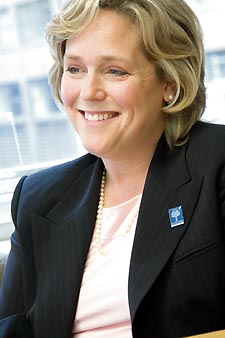 |
MW: I know that if some opponents of gay and lesbian families were to read what you just said about the difficulties that children actually face, they would say, ”That’s why we’re against it in the first place, because the children are paying the price for their parents.” How do you respond to that?
CHRISLER: I’d say they’re making it hard on our children because they’re teaching people all across this country that we should create a world that doesn’t affirm our children. The reality is that there are somewhere between six and eight million kids in this country right now being raised by gay and lesbian parents. They go to school. They participate in community activities. And they have a right to live in a world that treats them fairly and equally. Whether they have two moms or two dads is irrelevant in the school environment.
I’ve often said that parents have a right to teach their children whatever their moral conviction is. I have a right to teach my children that they should be Democrats, that the Republican party is not the place for them. What I don’t have the right to do is to then go into school and say, ”We can’t talk about the Republican party at all because I don’t believe in what the Republican party stands for and I don’t want you teaching that in school.” I mean, the Republican party exists. Of course we need to teach it in school. I can then have a conversation with my children to say ”This is what’s wrong with the Republican party.”
The truth is that people who don’t think that LGBT people should be parents can have that conversation with their children at home. As a matter of fact, the fact that we’re talking about it in school opens up a wonderful door for them to have a conversation about what their moral conviction is. But the place to do it is not in the school environment. In a school, every child has the right to learn and the way that children learn best is to have their own situation, their own environments affirmed to them.
MW: Have you run into any of those problems with your own kids?
CHRISLER: Our kids go to a wonderful preschool. It’s a really great environment. Almost every form said ”parent or guardian.” And then their teacher sent home a letter that said, ”We’re so excited to have you in our class…. Please remind your mom and dad to send in a change of clothes for you and make sure your lunch bag is labeled.”
I went in and met with the director about that, because even though I know there was no maliciousness intended, the reality is that there are lots of children who don’t have a mom and a dad. There are a couple of kids in our children’s preschool classroom who only have a mom. So it’s interesting. Even in really progressive places you continue to have to do that work of educating people.
MW: Have your kids ever expressed anything to you that made you sense that they felt like they were different or that they realized that things weren’t the same as the majority of other families?
CHRISLER: There’s no doubt that they understand that their family is different than our next door neighbors. We had that conversation with them from a very young age, that they have two moms and some kids have two dads and some have a mom and a dad. That’s been a part of our language in our household for a long time.
We have new neighbors two houses down, a really nice family. They have a daughter who is the same age as our kids. She came over to play one afternoon and said something to them about, ”Where’s your dad?” And Tim, my one son, said, ”We don’t have a dad.” And the little girl said, ”You have to have a dad.” And he said, ”No, you don’t have to have a dad. In our house we have two mommies. Some people have two mommies, some people have two daddies.” You could just hear the words coming back. One of the things we talk to our Family Pride membership about is that you have to be comfortable talking to your children about who your families are, because you have to give them the tools. Even at 4, my child is having a conversation with a friend about what his family is all about. It happens so young.
MW: Ten years ago it would have seemed like strange science fiction stuff to talk about two same gender parents creating a child with shared genetic material. Ten years from now that may just be possible, which will radically change how people approach a very fundamental part of being human. Do the political implications of those types of advances in reproductive technology worry you?
CHRISLER: Apart from LGBT politics and civil rights issues, we in this country have a very big question that we have to answer, which is, how do we define family? Since the ’50s there has been a very strong push to define family as a mom and a dad and two kids and a house with a white picket fence. I think we need to reframe what it means to be a family. In my mind, to be a family is to be loving and supportive of one another, to have a stable loving home environment, to set limits and guidelines for your children, to put people in their lives who will help build them up and not tear them down. It means providing for them economically, physically, emotionally, socially.
So, in that way, I think yes, advances in reproductive technology force us to have those conversations, and force us to help people understand that family doesn’t need to be narrowly defined as a married mom and a dad but it can be something bigger and still be really good.
MW: I’m guessing from the way you’ve spoken that you’re raising your boys to believe certain things that your family believes, and you’re transmitting your values to them. Are they surprising you at all in terms of exhibiting traditional gender roles in terms of being little boys?
CHRISLER: I’m not sure I’m surprised so much as I am amazed at how ingrained some of the things are. They were obsessed with bulldozers and construction equipment. It’s waned now, but for a while any time we went by a construction site, it was, ”Stop Mommy, bulldozer!” Now, Cheryl and I — not so much into the trucks and construction equipment. That’s not really what we brought to the table as parents, and yet they were obsessed with it. And that strikes me as typical boy behavior.
The other thing that I find surprising is when I watch our children play with girls. It really is different the way boys and girls play. Girls are much more relational. They are much more about talking, and our boys are both much more physical. Everything is just bigger with them — bigger gestures, bigger movement, bigger activity, bigger energy. It’s hard to get our kids to sit still for half an hour and color, but I’ve seen little girls spend three hours coloring. So I continue to be amazed, that there is something hard wired for most kids about how they relate in the world. What’s great about it is that we are perfectly comfortable having our kids play sports. They have a set of play tools, dragons and knights and swords and those sorts of things. But Tom has a particular affection for Disney princesses and has a Disney princess sticker book that he loves. In our house that’s fine and we enjoy that he’s happy about it. It doesn’t upset us or freak us out and I think in other households that might be more of a struggle. It’s good that we can let our children be who they want to be and not be so worried about what it all means. It allows you to really enjoy your kids in a different kind of way.
MW: We’ve talked about some very positive aspects of gay and lesbian families. You mentioned separation earlier in reference to the case in Utah. Does the GLBT community yet recognize the importance of being able to end relationships in a controlled way?
CHRISLER: What’s sort of ironic is that some of the best state case law that we are seeing being developed right now is coming out of bad breakups, which is really sad. It’s very sad for the families that are involved, it’s really sad for the children who are in the middle of it. The good news is that we’re seeing courts in a lot of places establish very good case law around that.
But I don’t think our community thinks about that at all. Because we can’t access marriage, we can’t protect ourselves in a breakup. In the course of a break-up, so much is at risk for you and your children when you’re not legally married. And in Florida, where you have a flat-out adoption ban and one parent is unable to legally adopt, that is a huge, huge issue. Because the biological parent, if there is one, or the legal adoptive parent has all the power and all the control, no matter how long the other partner has been in that child’s life. It’s sad and it’s scary and it’s really painful for the families that are going through it.
MW: For this next question I want to be clear that I’m not talking about abusive situations or nightmare relationships, but in a more reasonable situation, do gay and lesbian couples who adopt or choose to bring children into their relationship have a greater responsibility to try to stay together than couples who don’t have children? Do children bring a greater responsibility for trying to keep that unit together?
CHRISLER: I think children bring a greater responsibility for any couple, gay or straight, to stay together. When you become a parent, you obligate your life to your children. So, yes, there’s a huge burden on any set of parents to try to work out their relationship and try to remain committed to having a strong relationship because there’s no question that divorce and separation are hugely difficult for children. It doesn’t mean that they can’t weather it. It doesn’t mean that they don’t turn out fine. It doesn’t mean that parents can’t do a good job in the course of a breakup of providing support for a child. But nobody could say it’s no big deal for a child to go through a divorce or separation. It is a big deal. And every parent has an obligation to work really hard at their relationship to prevent that from happening to their children. I think all parents want that. I don’t know a single parent who doesn’t want desperately to make their relationship work even if they’re having a hard time because they don’t want to do that to their children.
MW: You’re talking about how children are raised and how they turn out in gay families. How do those issues impact your work?
CHRISLER: There are two pieces. Part of our new “Real Families, Real Facts” campaign is a push to get people to understand what the science says about LGBT parenting. If I could have every parent walk around with the confidence of knowing one thing, it would be that there is no debate about our ability to parent, despite the right’s effort to create one. There is no debate. Twenty-five years of scientifically valid, social science research says over and over again that the outcomes for children of LGBT parents is the same as outcomes of children being raised by straight parents.
[Tennessee state] Rep. Debra Young Maggart, one of the main proponents to ban LGBT people from adopting, just went on national Fox News and said there is evidence that gay and lesbian people have chronically unstable relationships and that gay men adopt children to have unfettered access to boys to subject them to a lifetime of abuse and molestation. It’s 2006 and we have a representative running around saying that. And it’s a lie. It’s just absolutely wrong. And it makes me so angry to listen to people like Rep. Maggart talk about how they are concerned about the interests of children and then to turn around and lie about LGBT parents.
What’s happening in our system is that there are 600,000 kids in foster care, and 120,000 are waiting for adoption. There are less than 20,000 certified parents in this country that can adopt from the foster care system. We have a crisis and children are languishing. And everybody should be able to put themselves up as a parent if they want to and if it’s determined that they are the best fit for that child. But it just makes me so angry that she can run around saying that.
MW: It’s kind of a throwback to the Anita Bryant days.
CHRISLER: It is. I cannot tell you the number of times I see Paul Cameron’s research quoted in one way or another. He’s been kicked out of the American Psychological Association, he has been banned from testifying in many states. His research is the most uncredible research as it relates to LGBT parents and yet we continue to see his stuff quoted in mainstream media outlets. So for us, debunking that, helping educate the American public about how untrue that is, helping people understand that there really is no scientific debate about our ability to parent, is a really important part of our work. The White House Easter Egg Roll will be held on Monday, April 17. Tickets for the event are free, but are distributed on a first-come, first-served basis starting Saturday, April 15. For information on how to participate in the White House Easter Egg Roll, visit the Family Pride Coalition’s Web site at www.familypride.org.
Support Metro Weekly’s Journalism
These are challenging times for news organizations. And yet it’s crucial we stay active and provide vital resources and information to both our local readers and the world. So won’t you please take a moment and consider supporting Metro Weekly with a membership? For as little as $5 a month, you can help ensure Metro Weekly magazine and MetroWeekly.com remain free, viable resources as we provide the best, most diverse, culturally-resonant LGBTQ coverage in both the D.C. region and around the world. Memberships come with exclusive perks and discounts, your own personal digital delivery of each week’s magazine (and an archive), access to our Member's Lounge when it launches this fall, and exclusive members-only items like Metro Weekly Membership Mugs and Tote Bags! Check out all our membership levels here and please join us today!








